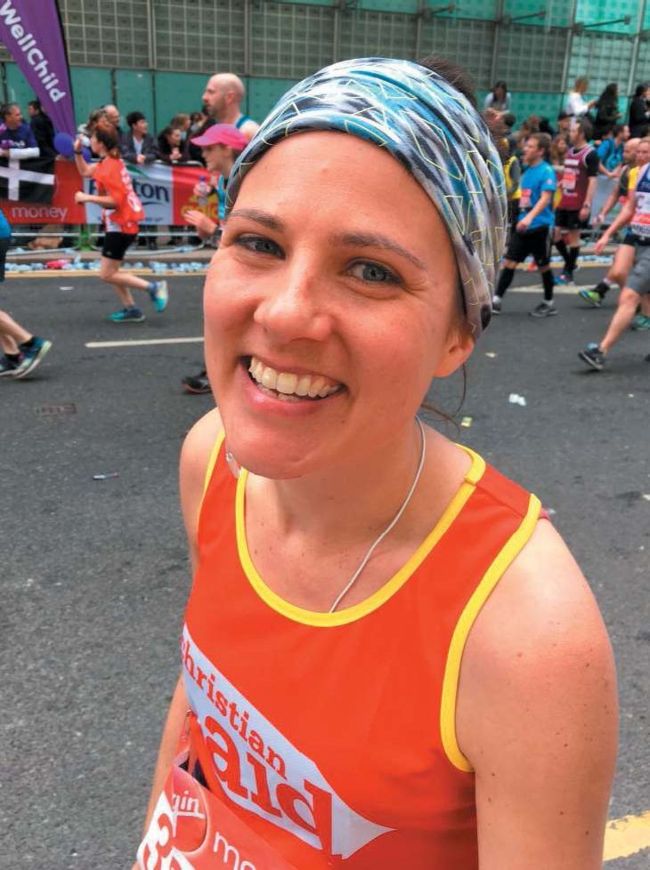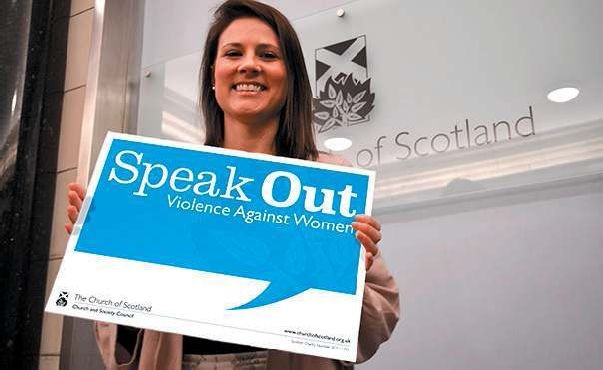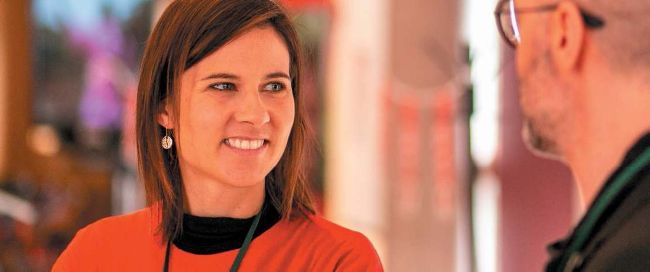Making change
Thomas Baldwin meets Fiona Buchanan of Christian Aid, a lifelong campaigner for climate and gender justice.
IT all started in church, says Fiona Buchanan. “We did campaigns training recently where we identified where our passion or commitment comes from,” says Christian Aid Scotland’s Campaigns and Advocacy Coordinator. “And I have a sense it came from church – I can’t pin it down but I think hearing the stories of mission partners and different organisations that work for justice and equality, that is probably where it comes from – as well as from my parents, who were very much committed to it as well.”
The church in question is Carrick Knowe in Edinburgh, to which Fiona has belonged all her 37 years. She has also been organist and choir director and has run the Girlguiding unit all her adult life, and was ordained as an elder when she was 28.
“It has always been part of my life,” she says. “It was very much the sense of growing up in a community, and still being part of that community.
“It’s also linked to family. My dad’s the session clerk, my mum was the Sunday School superintendent for years, and my sisters are both involved as well.
“But also having the sense of the church family as well, is something I’ve always really appreciated. One of the elders died recently in his 90s, and I always counted him as a friend. Church is a place where you can have friends in their 90s, and you can have friends who are much younger than you, which I don’t really see in other parts of my life.
“So I’ve always valued that and the support that’s there.” Perhaps inevitably, Fiona was encouraged to engage with the national church, and over the years has been involved with the National Youth Assembly, served on the World Mission Council and Ecumenical Relations Committee, and had a stint working at ‘121’ for the Church and Society Council. She also became the first woman to play the organ at the General Assembly.
Fiona says that she always knew she wanted to work in the voluntary sector and ‘making change in some way’: “The extent to which inequality is so pervasive has always been obvious to me, and when I was younger I was shocked that people could just carry on and I remember thinking ‘why are you not doing something about this, it’s all around us’.”
She studied at Edinburgh University – initially studying human and social geography, and then a masters in Scottish studies, focusing on the intersection between faith and social action. “I did my dissertation on the Iona Community. I’m not a member but I’m really interested in its identity as physically rooted in Scotland but with this global ecumenical identity and commitment to quite radical social action.”
As well as the Church and Society Council, she worked for Women’s Aid and Young Scot before starting her current position, which she describes as her dream job, in 2017.
“I remind myself that if I look back to when I was in my early teens, this would definitely have been the dream,” she says. “It’s what I always imagined I’d be doing.
“What I love about the role is being able to work with people in Scotland, to help them deliver campaigns that have a global impact.”
Day-to-day, the job involves working with London-based colleagues to give a Scottish input to the design of Christian Aid’s campaigns, making sure that they are relevant to churches and communities in Scotland. The advocacy element of the role enables the charity and its supporters to hold institutions, including churches, governments and politicians, to account.
“Tinkering around the edges of policy and legislation isn’t enough to end poverty,” Fiona says. “We need our decision-makers to commit to the larges-scale structural changes required to end poverty, along with climate change and other forms of injustice.”
She also spends time travelling round Scotland speaking in churches and meeting local campaigners. “I love the face-to-face element and feel energised by the people I meet. We often hear negative stories about the Church and numbers declining, but whenever I go to places I’m always really encouraged by the conversations I have with people and the commitment they have to supporting Christian Aid and challenging inequality and injustice.”
She says that she sees the Church as ‘thoughtful and reflective on issues of social justice’, but is surprised and disappointed by the decisions of the last two General Assemblies to continue investing in fossil fuels: “As much as I understand the system of decision-making of the General Assembly, when it isn’t or can’t be a way for taking into account more oppressed or marginalised voices, I find that uncomfortable.”
The other part of the job she loves is coalition and partnership working, including chairing the public campaigns group of Stop Climate Chaos Scotland.
“We manifest a lot of our climate justice work in Scotland through that coalition, with development agencies like SCIAF and Oxfam but also campaign groups like WWF and Friends of the Earth.

Fiona Buchanan
“It functions really well as a coalition. We had great success with the first Scottish Climate Change Act 10 years ago, when we managed to achieve strong targets. This time we’ve been campaigning for two years on the Scottish Climate Bill making its way through Parliament and are hoping that together we can push for similarly strong legislation.
“Christian Aid or the Church of Scotland by themselves couldn’t have nearly as much impact, but alongside the really effective coalition it’s a good example of how civil society can campaign together and see an impact in legislation.”
The extent to which inequality is so pervasive has always been obvious to me, and when I was younger I was shocked that people could just carry on and I remember thinking ‘why are you not doing something about this, it’s all around us’.
The past year or so has seen a ramping up of the scientific warnings on the climate emergency, but also campaigning on the issue. Fiona says she has been re-energised by the emergence of new groups including Extinction Rebellion and the school climate strikers. “It felt like campaigning on climate change had become a niche interest, but all of a sudden there’s been an explosion of action and concern in an incredibly vibrant and creative way.
“I’m quite excited and energised by that, as much as the reality of climate change is still very frightening and overwhelming.”
Another key aspect to Christian Aid’s programme is gender justice, which is an area Fiona has been actively engaged in most of her life. She is one of the copresidents of the Ecumenical Forum of European Christian Women (EFECW), which supports women of faith, campaigns on women’s rights and awards grants to projects working in faith and gender justice.

Fiona Buchanan
Fiona became involved through the Ecumenical Relations Committee of the Church of Scotland, which led to her stewarding at a World Council of Churches event. She was invited to an EFECW conference in Germany, then asked to become national coordinator for Scotland, joining the central committee in 2014 and then elected as one of the co-presidents (the Forum has three co-presidents, one each from the Reformed/Protestant, Roman Catholic and Orthodox traditions) in Serbia last year.
She says: “It’s been a great experience, and the Forum is a great example of a place where they’re really nurturing younger women in leadership.
“It allows women to share their theology ecumenically and understand each others’ traditions, but also very much supporting women from the east of Europe and working on issues of peace, justice and reconciliation as they affect women in the churches.
“It’s been a really interesting space, trying to maintain that tension of it being a diverse forum – it had to be called a forum because many of the Orthodox and Catholic churches wouldn’t have allowed women to attend if it had a different name. I was at a meeting in Tallinn in Estonia recently and we were hearing from women from Belarus who were saying ‘we can’t meet in groups of more than two or three women in our country, even to travel here we had to ask permission from a priest’ – and you’re just constantly reminded how different things are in different parts of Europe.
“One of the concerns we have at the moment is around the regression of women’s rights in some European countries and in particular the role churches are playing in that. In Latvia they’ve revoked the ordination of women, and there are concerns in other parts of Europe that similar things could happen. And in some other countries conservative churches are lobbying governments to not enact legislation on violence against women.”
On the Church of Scotland’s record on gender issues, she says it is ‘great’ that the Church has become the first denomination in Scotland to have a dedicated gender justice officer post.
However, she says that the General Assembly’s rejection of moves to ensure gender equality in the new Trustees body, ‘shows the Church doesn’t really understand what gender inequality is’: “If women don’t see themselves represented at senior levels or in certain positions, they’re not going to put themselves forward for those positions.
“There’s a myth that says quotas mean you don’t get the best people for the job, but when you continue to see male-dominated leadership and committees you’re essentially saying that men are better for the job – to me, that’s not equality.
“This imbalance can also mean that at times of change, we risk gender justice being seen as an ‘add on’ and not core to the life of the Church – we need to protect this focus as integral to our faith to ensure that the regression I mentioned in Europe doesn’t happen here.”
In the bigger picture, she says that there’s a sense that there hasn’t been a great deal of progress on gender justice in 20 years, but that again a lot of her hope is through younger people and new movements emerging. “Things like campaigning on period poverty, or #metoo, or No More Page Three – there are so many examples where women have said ‘enough, we’ve put up with this for years’, and built really creative and inspirational campaigns around it. I find that really encouraging and positive.
“The sense of movements and mobilising people, and what people can achieve when they’re working together for a purpose, has always been where I find my energy.”
It’s a girl-only space, girl-led, and I think it’s really important for young women to have the chance to have that space.
And that is also reflected in another of the strands of her life, Girlguiding, which she joined as a Brownie, progressed through the Guides and has been running the unit at Carrick Knowe since the previous leader left when Fiona was 19. “It’s one of the few ways in which there are a lot of young people involved in the church now – maybe 150 young women coming through my church each week.
“It’s a girl-only space, girl-led, and I think it’s really important for young women to have the chance to have that space. A lot of it is about gaining skills – leadership, communication, team-building, that kind of thing – but it’s also about having fun, having that experience together and also about being able to relax. A lot of them say ‘we can’t really do this at school’ where it’s mixed, so they really value that space, I think.”
She adds that organisations like Girlguiding are as important as they have ever been, particularly with the pressures on teenagers (especially girls) these days. “I think Girlguiding has really recognised and reflected this, and what they’re doing with their new campaigns and initiatives is really amazing.
“I was a mentor in an advocacy initiative called Action for Change, where over 60 young women in Scotland were supported to design and run a campaign on something they were passionate about – girls in sport, women in STEM [science, technology, engineering and mathematics], ethical fashion, disability access – a whole range of issues.
“And we also co-ordinated a programme called Camp CEO, where 50 young women and a number of female chief executives and leaders from Scottish society spent a weekend together. It was about nurturing self-confidence and showing young women that traditional models of leadership are quite patriarchal, and that can be challenged.
There are different ways to be a leader, different ways of leadership.”
In her spare time from all that, Fiona runs – when we meet she is just back from Skye, where she ran the half marathon, and she has previously completed both London and Edinburgh marathons for Christian Aid.
She says: “Running the marathons was a great personal challenge, but also very much felt like a team effort. We did the Edinburgh Marathon last year for the Church of Scotland Youth Moderator’s Challenge, and it was really good fun working with Robin [Downie, last year’s Youth Moderator] and Callum [Scott] to not only fundraise for Christian Aid but to inspire each other with training tips and motivation. If running isn’t your thing, there are plenty of other ways to get involved!”

Fiona Buchanan